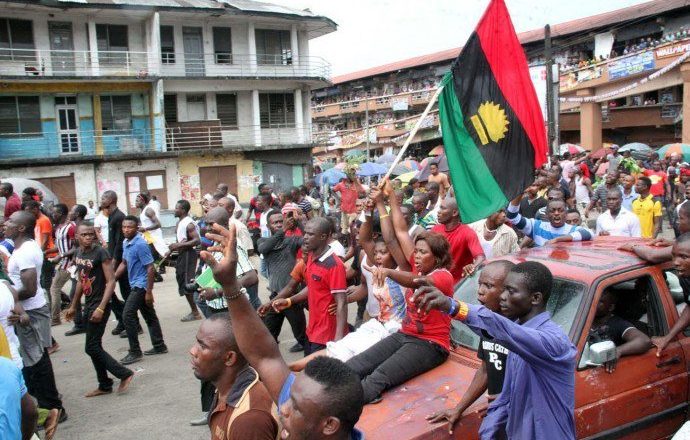The proscribed Indigenous People of Biafra (IPOB) on Friday, sued Nigerian Government and Army for proscribing its activities and tagging it a terrorist organisation. At a Federal High Court in Abuja on Friday, IPOB prayed the court to set aside the order of injunction proscribing its activities. The Chief Judge of the Federal High Court, Justice Abdul Kafarati, on Wednesday in Abuja, granted Federal Government an interim injunction proscribing activities of the group.
Kafarati granted the injunction in chambers after the Minister of Justice, Mr. Abubakar Malami, had approached the court with an exparte motion urging the court to do so. President Muhammadu Buhari had earlier given written approval for the proscription of the group, pending legal process. Governors of the Southeast states took the first step to ban the activities of the group after the military had declared it a militant terrorist group.
Ifeanyi Ejiofor, counsel to IPOB, led Maxwell Okpara, Chinwe Umeche, Habila Turshak, P. M. Umegborogu and Augustine Ezeokeke to file the process on behalf of the group. The motion, with suit number FHC/ABJ/CS/871/17 was brought pursuant to Section 6(6) (1) (4) of the 1999 Constitution of the Federal Republic of Nigeria as amended in 2011.
It was also brought under the inherent jurisdiction of the court. The office of the Attorney-General of the Federation was listed as respondent. The applicant averred that the grounds upon which the application was brought hinged on the fact that the Sept.20 exparte order made against it by the court was without jurisdiction. The lead counsel said the order granted against the entity was unknown to law. Ejiofor posited that there was clear suppression and misrepresentation of facts in the AGF’s affidavit evidence, pursuance to which the order was granted.
“The order is unconstitutional, as it was made in clear violation of constitutionally guaranteed right of the Indigenous People of Biafra to self-determination. It also violated Article 20(1) of the Africa Charter on Human & Peoples Rights, now domesticated into our law under (Ratification and Enforcement Act) (Cap 10) Laws of the Federation of Nigeria 1990.
“It ran against the right to fair hearing, right to freedom of expression and the press. “It further violated the right to peaceful assembly and association clearly provided for under sections 36, 39 and 40 of the 1999 Constitution of the Federal Republic of Nigeria as (Amended) 2011,’’ Ejiofor said.
The Authority

